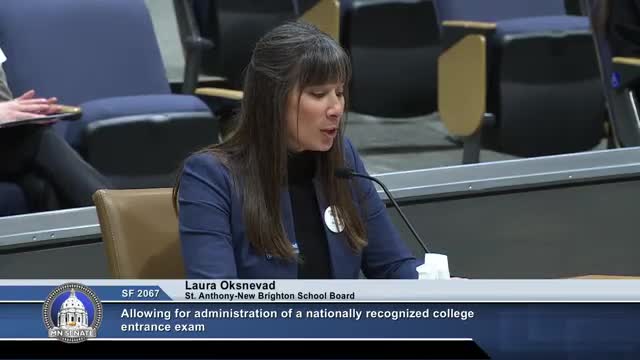Minnesota advocates replace MCA testing with ACT for high school assessments
March 11, 2025 | Education Policy, Senate, Committees, Legislative, Minnesota
This article was created by AI summarizing key points discussed. AI makes mistakes, so for full details and context, please refer to the video of the full meeting. Please report any errors so we can fix them. Report an error »

The Minnesota Senate Committee on Education Policy convened on March 10, 2025, to discuss significant changes to the state's high school assessment system. The primary focus of the meeting was Senate File 2067, which proposes replacing the Minnesota Comprehensive Assessments (MCAs) with a nationally recognized college entrance exam, such as the ACT.
Dr. Josh Swanson, Superintendent of Eden Prairie Schools, presented compelling arguments for the transition. He highlighted that the current MCA testing model is failing to engage students, with participation rates alarmingly low—only 30% of students take the math MCA, while opt-out rates for reading and science exams range from 30% to 50%. Dr. Swanson emphasized that the MCAs no longer provide reliable data for educational decision-making, as the low participation undermines their validity.
In contrast, he noted that over 95% of students voluntarily take the ACT, which offers actionable data that can inform educational programming and support student success. Dr. Swanson argued that continuing to invest in the MCAs is a misuse of state resources and that aligning assessments with what students are already choosing would be more beneficial.
Sienna Obel, a senior at Eden Prairie High School, echoed Dr. Swanson's sentiments during her testimony. She expressed that the MCAs do not hold significance for college admissions and that students are increasingly focused on enhancing their resumes through activities and assessments that colleges value, such as the ACT and SAT. Obel pointed out that with rising tuition costs and competitive admissions, students need to prioritize assessments that will truly benefit their future prospects.
The committee's discussions underscored a growing consensus on the need for a more relevant and engaging assessment system that aligns with students' educational and career aspirations. The proposed shift to a unified assessment system aims to enhance student engagement, reduce opt-out rates, and provide meaningful data for families and educators.
As the meeting concluded, the committee members expressed their appreciation for the testimonies and the importance of moving forward with the proposed legislation. The next steps will involve further deliberation on the bill, with the potential for significant changes to Minnesota's high school assessment landscape on the horizon.
Dr. Josh Swanson, Superintendent of Eden Prairie Schools, presented compelling arguments for the transition. He highlighted that the current MCA testing model is failing to engage students, with participation rates alarmingly low—only 30% of students take the math MCA, while opt-out rates for reading and science exams range from 30% to 50%. Dr. Swanson emphasized that the MCAs no longer provide reliable data for educational decision-making, as the low participation undermines their validity.
In contrast, he noted that over 95% of students voluntarily take the ACT, which offers actionable data that can inform educational programming and support student success. Dr. Swanson argued that continuing to invest in the MCAs is a misuse of state resources and that aligning assessments with what students are already choosing would be more beneficial.
Sienna Obel, a senior at Eden Prairie High School, echoed Dr. Swanson's sentiments during her testimony. She expressed that the MCAs do not hold significance for college admissions and that students are increasingly focused on enhancing their resumes through activities and assessments that colleges value, such as the ACT and SAT. Obel pointed out that with rising tuition costs and competitive admissions, students need to prioritize assessments that will truly benefit their future prospects.
The committee's discussions underscored a growing consensus on the need for a more relevant and engaging assessment system that aligns with students' educational and career aspirations. The proposed shift to a unified assessment system aims to enhance student engagement, reduce opt-out rates, and provide meaningful data for families and educators.
As the meeting concluded, the committee members expressed their appreciation for the testimonies and the importance of moving forward with the proposed legislation. The next steps will involve further deliberation on the bill, with the potential for significant changes to Minnesota's high school assessment landscape on the horizon.
View full meeting
This article is based on a recent meeting—watch the full video and explore the complete transcript for deeper insights into the discussion.
View full meeting
